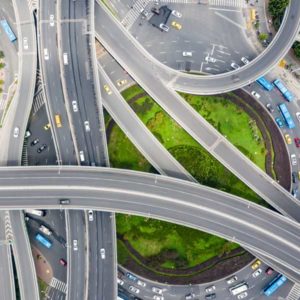 The United States has fallen chronically far behind the rest of the world in meeting its needs for infrastructure, creating agreement among President Biden and Republicans and Democrats in Congress that the country needs to act.
The United States has fallen chronically far behind the rest of the world in meeting its needs for infrastructure, creating agreement among President Biden and Republicans and Democrats in Congress that the country needs to act.
While there is bipartisan agreement on the goal of addressing infrastructure, partisan disagreement on significant details have prevented meaningful bipartisan action for years. Some of the disagreement is over what should be included in an infrastructure package. There is general bipartisan agreement that the country needs to address inadequacies in the capacity and maintenance of our highways, roads, and bridges. The Highway Trust Fund is less than a year from insolvency.
Partisan differences emerge, however, in what beyond highways, roads, and bridges should be included. Democrats, for example, are more enthusiastic about investment in mass transit. There is significant bipartisan support for improving communications and digital infrastructure (see the broadband issue above) as well as some clean energy infrastructure, though Democratic support tends to be more ambitious in these areas. Democrats tend to be more supportive than Republicans of including housing in an infrastructure package.
The most significant partisan differences over infrastructure are on how much to spend and how to pay for it. The Biden Administration and congressional Democrats are currently discussing spending more than $2 trillion to modernize an expansive list of types of infrastructure over ten years. Republicans, and some Democrats, are objecting to that amount of spending, especially after legislation authorizing nearly $6 trillion in COVID relief. Objections are also being raised to including measures they don’t believe belong in an infrastructure package. Republicans, and some Democrats, are also opposed to the significant tax increases that would be required to pay for such a large infrastructure package.
If CommonSense American members chose infrastructure as one of our topics, we would focus on bills with the best prospects of bipartisan support. One promising example is American’s Transportation Infrastructure Act (ATIA) of 2019. It was introduced on July 29, 2019, by four members of the Senate Committee on Environment and Public Works (EPW): Senators Josh Barrasso (R-WY), Tom Carper (D-DE), Shelley Moore Capito (R-WV), and Ben Cardin (D-MD). It received unanimous, bipartisan support from the Committee and is likely to be reintroduced in the 117th Congress.
ATIA would take a significant step in addressing our nation’s $2 trillion infrastructure funding gap. It would authorize $287 billion in Highway Trust Fund spending over five years, a 27 percent increase from the last reauthorization bill. The legislation would invest $10 billion in policies and innovative projects aimed at reducing emissions. It would authorize $259 billion to be distributed to states by a formula and establish a program to support projects that would improve the resiliency of roads and bridges to natural disasters and extreme weather events.
Investment in the infrastructure needed to make sure every American has clean and safe water in another area attracting wide, bipartisan support. The experience of residents in Flint, Michigan have demonstrated the need to replace lead pipes. More than 500,00 children in the United States have elevated levels of lead in their blood, primarily from lead paint and pipes. Up to ten million homes across the country get water through lead pipes that connect the main drinking water line in the street to their homes.
The Drinking Water and Wastewater Infrastructure Act of 2021 (DWWIA 2021) would address many of these water infrastructure issues. This legislation authorizes more than $35 billion for drinking water and wastewater projects across the country with a focus on upgrading aging infrastructure, addressing the threat of climate change, investing in new technologies, and providing assistance to marginalized communities. The package includes a provision to establish new pilot programs that award grants to help low-income households pay their drinking water or wastewater bills. DWWIA 2021 also includes two programs to create new resiliency grants for water systems and treatment works to increase their ability to withstand natural hazards, including extreme weather.
On March 24, 2021, the Senate Environment and Public Works Committee voted unanimously (20-0) to approve the DWWIA 2021 bill. It was introduced by Senators Ben Cardin (D-MD), Shelly Moore Capito (R-WV), Tammy Duckworth (D-IL), Cynthia Lummis (R-WY), Tom Carper (D-DE), and Kevin Cramer (R-ND). Six more Senators (four Democrat and two Republican) co-sponsored the legislation.

